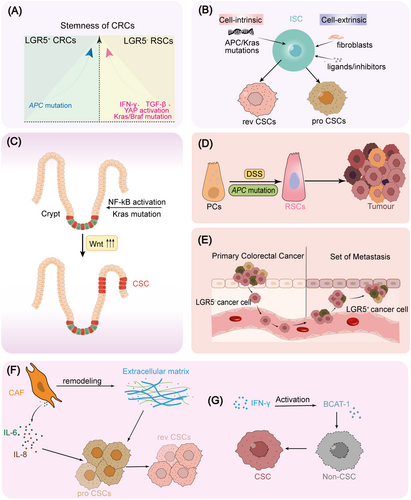MedComm-Oncology | Characteristic, Regulation and Targeting Strategies of Cancer Stem Cells and Their Niche in Digestive System Tumors

Open the phone and scan

CSC plasticity in tumorigenesis, metastasis and therapy. (A) APC mutation enhances stemness of LGR5+ CSC, whereas IFN-γ, TGF-β and Kras/Braf mutations enhance stemness of LGR5- RSC. (B) Tranformation from ISCs to toward proCSCs or revCSCs under the influence of intracellular mutations and extracellular niche factors. (C) NF-κB activation or Kras mutation causes hyperactivation of Wnt signaling pathway, which causes tumorigenesis from mature epithelial cells to dedifferentiate into CSCs. (D) APC mutation in Panes cells induces cell-fate transformation into revival stem cells to drive tumorigenesis. (E) Cell plasticity from LGR5- cells to LGR5+ cells during the process of transmission of colorectal cancer. (F) CAFs promote the transformation of proCSCs into revCSCs by remodeling tumor extracellular matrix or secreting cytokines such as IL-6 and IL-8. (G) IFN-γ drives cell-fate plasticity from non-CSCs to CSCs via BCAT-1-dependent manner. PCs, Paneth cells.
Digestive system tumor, including esophageal tumor, gastric tumor, intestinal tumor, liver tumor, pancreatic tumor, and cholangiocarcinoma, are the most common tumors worldwide and serve as a major cause of tumor-related death. Cancer stem cells (CSCs) are a small group of cells in tumors that harbor self-renewal, differentiation abilities, playing a crucial role in tumor initiation, progression, metastasis, and are supposed to be the fundamental cause of tumor recurrence after conventional treatment. A comprehensive understanding and targeting of CSCs is the key to overcoming tumors. In this review, focusing on digestive system tumors, we summarize the characteristics of CSCs, review the intracellular mechanisms that regulate self-renewal and functional maintenance of CSCs, including stemness pathways, transcription and epigenetic regulation, metabolic regulation, and noncoding RNAs, and demonstrate microenvironmental regulation and systemic regulation of CSCs at molecular and cellular levels. Finally, we summarize recent advances in tumor therapy with CSC targeting and their niche remodeling. These research progress on CSCs in digestive system tumors provide crucial insights into the occurrence, development, drug resistance, recurrence and metastasis of tumors, and offers new targeted treatment strategies for defeating tumors.
Article Access: https://doi.org/10.1002/mog2.70015
More about MedComm-Oncology: https://onlinelibrary.wiley.com/journal/27696448
Looking forward to your contributions.


